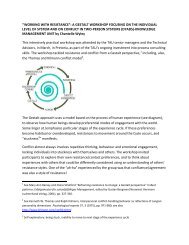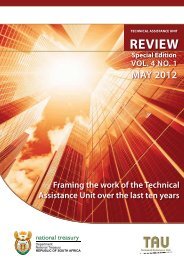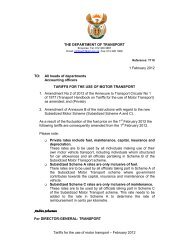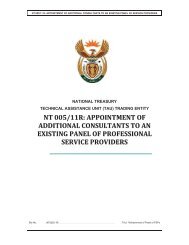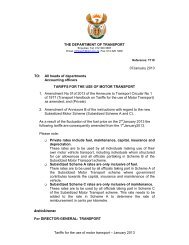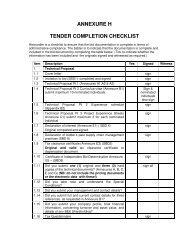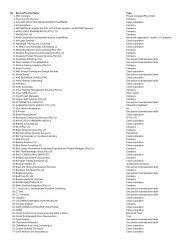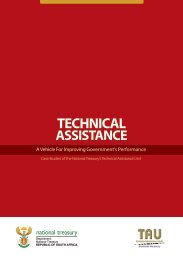Review 3 final 2 - TAU - National Treasury
Review 3 final 2 - TAU - National Treasury
Review 3 final 2 - TAU - National Treasury
You also want an ePaper? Increase the reach of your titles
YUMPU automatically turns print PDFs into web optimized ePapers that Google loves.
TECHNICAL ASSISTANCE UNIT REVIEW | Green Governance<br />
And therein lies a problem…<br />
The future, given our current crises in resource<br />
depletion and climate altering human impacts, cannot<br />
be built as an extrapolation of the present. Our future<br />
has to be based on a fundamentally different premise.<br />
Things like service delivery, utility infrastructure systems<br />
and economic organisation need to be recast within a<br />
different paradigm of the future. There is an increasing<br />
disjuncture between what we know has to happen<br />
in order for society to avoid and mitigate the worst<br />
impacts of climate, energy and mass consumption<br />
(building resilience) and the immediate demands<br />
of big business and governments under pressure to<br />
deliver. In such instances it is easier to fall back on<br />
the tried and tested, than to risk experimenting with<br />
what seems like new and untested (in the minds and<br />
rhetoric of some) technologies and ideas. But we have<br />
reached a tipping point- and sustainable solutions and<br />
technologies are now viable and can realistically disrupt<br />
old technologies in a positive and comprehensive<br />
manner. A sustainable future is available, we just need<br />
find the way to distribute it.<br />
In South Africa (and the world) we not only face critical<br />
challenges as a result of global warming, oil depletion<br />
and other uncontrolled exploitation of non-renewable<br />
resources we are also facing problems associated with<br />
economic marginalisation and growing inequality. If<br />
we do not tackle this social and economic injustice,<br />
then that inequality will deal destructively with our<br />
economies and societies. Building resilience, from an<br />
ecosystems perspective, but also a social perspective<br />
is critical. But we cannot get ahead of this problem, or<br />
tackle it at its roots, within the economic, social and<br />
political frameworks that got us here in the first place.<br />
We do need a fundamental transformation in our ways<br />
of being, of producing and of relating to each other<br />
and to the planet. That requires us to look at these<br />
systems as a whole and not to tackle these problems<br />
piecemeal – triple bottom line reporting, carbon taxes<br />
and so-forth all have their role, but only if placed in the<br />
context of a different mind-set and paradigm. If we<br />
have these debates outside of a paradigm shift, it is like<br />
deciding whether to sit upstairs or downstairs on a bus<br />
that is going the wrong way.<br />
TOWARDS RESILIENCE - RESOURCE<br />
EFFICIENCY AND THE DE- MATERIALISATION<br />
OF THE ECONOMY<br />
According to the United Nations Environment<br />
Programme, resource efficiency represents a critical<br />
opportunity to address our unsustainable path, by<br />
building green economies in which economic growth<br />
is decoupled from environmental harm. By enabling<br />
the design and production of low-impact products<br />
and services, resource efficiency can help us meet<br />
human needs, while respecting the ecological carrying<br />
capacity of the earth.<br />
Resource efficiency is about the management of<br />
South Africa’s natural resources and the natural and<br />
human-made resource flows within the economy.<br />
It stresses, that in a world of increasing demands on<br />
scarce economic resources, the conscious and efficient<br />
management of our natural resources and of resource<br />
flows through the economy is critical to South Africa’s<br />
economic efficiency, success, competitiveness and<br />
sustainability.<br />
Approached creatively, resource management<br />
and efficiencies can lead to improved productivity,<br />
increased employment and can stimulate a growing<br />
“green” economy that supports economic development<br />
and employment creation.<br />
At the moment there is no single agency or department<br />
page 35<br />
Enabling change for development



